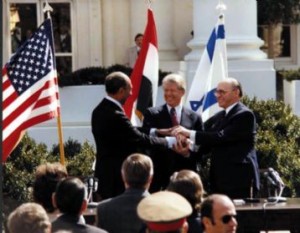In a blog post from earlier this week, Ben Sales suggested that the tension between supporters and opponents of Israeli settlements in the West Bank is nothing new. I would argue that the current tension between Washington and Jerusalem is a new and alarming development, one which should concern all supporters of Israel. But it also creates rare possibilities for progress in Israeli-Palestinian relations.
For those of us who support Israel and believe in a two-state solution, the diplomatic tension tends to play out in an internal struggle: What are we supposed to wish for? The principle of the United States pressuring Israel is unsettling, and continuing tension between the two nations would be even greater cause for concern. But in a diplomatic showdown between one leader who believes in a two-state solution (Barack Obama) and one who does not (Binyamin Netanyahu) – or one who at least refuses to admit that he does – how can a peacenik side with the latter?
There have only been two previous instances in which Israel has had a Likud prime minister while the United States has had a Democratic president. Given the generally (relatively) dovish policies of the Democratic Party and generally (relatively) hawkish policies of the Likud, such situations could be expected to breed tension between the two leaders. The more recent of these instances was when Bibi Netanyahu was elected in 1996, late in Bill Clinton’s first term in office. In that case, Netanyahu adhered to the agreements already signed between Israel and the Palestinians, but no real progress was made toward a final-status agreement. Bibi lost the following election in a landslide to the more dovish Ehud Barak, who was more open to negotiations with the Palestinians.
The current situation may have more in common with the situation in Israel from 1977 until 1981, as both Jimmy Carter and Menachem Begin led their respective nations. In 1977, the Israeli prime minister was elected shortly after the American president took office. Wary from eight years of Republican rule, the American population had chosen a new approach. At the same time, the Israeli public had turned for the first time against the center-left leaders whom they blamed for mishandling the military and whom they suspected of corruption, instead electing a prime minister from the Likud. Thus, Israeli politics took a significant right turn, as American politics veered to the left. Sound familiar?
In that case, President Carter put pressure on Prime Minister Begin to negotiate with Egypt – previously the greatest threat to Israel’s security. The result was the Camp David Accords, the most significant and lasting peace agreement between Israel and an Arab body.
Will the tension between President Obama and Prime Minister Netanyahu be as fruitful as that between President Carter and Prime Minister Begin? Perhaps it has already begun. In a major foreign policy speech scheduled for Sunday, Netanyahu is expected to express his support for a two-state solution. Unprecedented. Just like in 1977.

